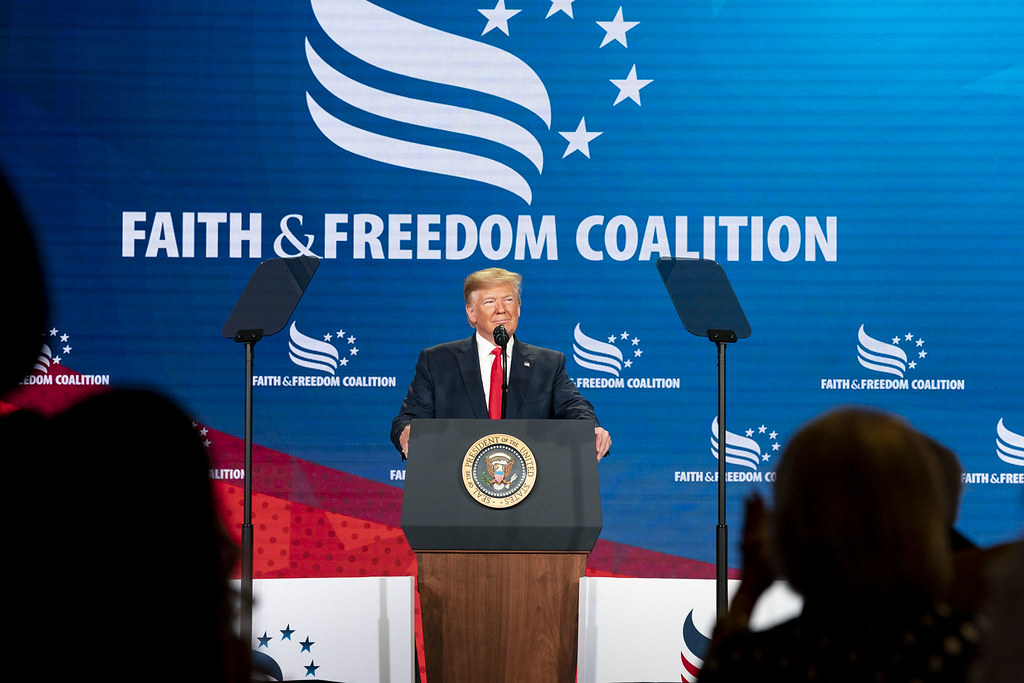Although the next presidential election is still 31⁄2 years away, some Republican hopefuls are already taking tentative first steps that could, eventually, lead to the White House.
Top GOP leaders will be at the Faith and Freedom Coalition’s “Road to Majority” conference, which will take place June 17-19 in Orlando, Florida, to court some of their party’s most important members — religious conservatives — and see how these voters respond to their pitch.
The list of invited speakers includes big names like former President Donald Trump — who has not yet ruled out running in 2024 — and Missouri Sen. Josh Hawley. Politicians that many see as the future of the Republican Party, like Florida Gov. Ron DeSantis, are also expected to make an appearance, along with lesser known but still important figures like Mark Robinson, the lieutenant governor of North Carolina, and Rep. Madison Cawthorn, R-North Carolina, who is currently the youngest member of Congress.
Events like the Faith and Freedom Coalition’s conference offer politicians a chance to deliver unfiltered messages directly to members of the public — helping to shape the national dialogue — as well as the opportunity to connect with potential supporters and donors, experts on religion and politics say.
Attendees leave the conferences energized. Back home, they start spreading the word about different political candidates and some become early organizers for future presidential campaigns.
To some extent, the “Road to Majority” and gatherings like it can make or break a Republican candidate’s relationship with religious conservatives, who play a key role in the GOP, said Mark Rozell, dean of George Mason University’s Schar School of Policy and Government.
These events can be the start of a relationship between candidates and attendees that leads to cash donations, campaign volunteering and a supportive buzz — little things that make a big difference over time.
“It’s not the event itself — it’s the snowballing effect over time,” Rozell said, adding, “I would expect any presidential aspirant to show up.”
The Faith and Freedom Coalition was founded by Ralph Reed, a powerful religious and political leader whom Time Magazine once called “the right hand of God” in a 1995 article about his former organization, the Christian Coalition.
The Faith and Freedom Coalition, launched in 2009, aims to cast a wider net than Reed’s previous group. It seeks to serve not just Christian conservatives, but “values voters” of many stripes, Reed told The Economist in 2010.
By 2011, CNN was already calling the organization a “political powerhouse,” noting that “just about every Republican” who hoped to snag the 2012 GOP nomination would be present at the group’s annual conference that year.
However, the Faith and Freedom Coalition’s $50 million push to get out the conservative vote in 2020 failed to win Trump the reelection he was looking for. Now, they’re regrouping.
The goal of the Faith and Freedom Coalition’s conferences is not just to connect voters with Republican stars, said Tim Head, the organization’s executive director.
The gatherings also create “synergy and momentum” and impact the GOP’s policy plans, he said, explaining that state and local politicians — who are both speakers and attendees at such conferences — pick up ideas from organized presentations to casual chats in the hallways and everywhere in between.
“It’s very common that those organic conversations and presentations end up making their way into legislation,” Head said. “A Texas legislator ends up presenting on what happened in the (state) legislature this year and then we get a call from a guy in Tennessee, ‘Hey, can you get me in touch?’ or ‘I’ve been working on a bill.’”
In this manner, policies and legislation “spread like wildfire,” he added. “Conferences are a great way for these things to jump state lines.”
The Faith and Freedom Coalition’s conferences help steer the Republican Party, Rozell said. They enable GOP leaders to see what politicians or policies animate the religious conservatives in the crowd.
Religious conservatives, he explained, “have an outsize influence on Republican nominations — not only at the national level but particularly at the state and local level.”
And conferences like the “Road to Majority,” Rozell added, “have a significant impact on many of the leaders and supporters of religious conservative organizations.”
However, other academics are less convinced about the impact of such events.
For example, Clyde Wilcox, a professor of government at Georgetown University who used to attend the Christian Coalition’s annual conferences, says that, back then, there was little correlation between which politicians appeared at the event and who ended up becoming the Republican presidential nominee.
But Rozell believes the buzz generated by these conferences can begin to translate to a groundswell that could potentially carry a candidate to the White House.
“Money follows political support,” he said. “Being able to build a grassroots network of potential supporters and being a leader in the culture wars — that’s going to bring money.”
Raising credibility and visibility among the grassroots helps deliver “significant funds to their future campaigns,” Rozell added.
